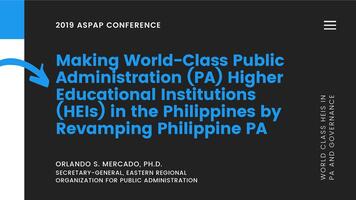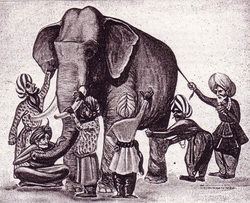- Home
- About
-
Publications
- Public Administration News
-
ARPA
>
- ARPA Scope and Objectives
- ARPA Editorial Board
- ARPA Call for Papers
- Submit Article
-
ARPA Open Access
>
- India (2020-2023, Vol. 31, Nos. 1&2, pg. 4-22)
- Nepal (2020-2023, Vol. 31, Nos. 1&2, pg. 23-46)
- Vietnam (2020-2023, Vol. 31, Nos. 1&2, pg. 47-67)
- China (2020-2023, Vol. 31, Nos. 1&2, pg. 68-79)
- South Korea (2020-2023, Vol. 31, Nos. 1&2, pg. 80-99)
- Bangladesh (2020-2023, Vol. 31, Nos. 1&2, pg. 100-119)
- USA (2020-2023, Vol. 31, Nos. 1&2, pg. 120-141)
- Abstracts >
- Publication Ethics and Malpractice Statement
- Notes for Contributors
- Journal Indexing
- EROPA Bulletin >
- Resources >
- Membership
-
Conferences
-
Activities
- #TAG Dialogue
- Contact Us
 These set of slides were presented by Secretary-General Dr. Orlando Mercado during the 2019 ASPAP Conference and General Assembly on The Role of Higher Educational Institutions (HEIs) in Public Administration: Engaging Stakeholders beyond the Conventional held at the International Center for Public Administration, National College of Public Administration, University of the Philippines, Philippines, on 14 to 15 November 2019. Secretary-General Mercado was invited to serve as a resource person in the Plenary Session on "World-Class HEIs in PA and Governance" wherein he presented the idea of revamping Philippine PA as one means of making world-class HEIs out of PA universities and colleges.
0 Comments
opening statement during the international seminar on e-governance in asia, beijing, china29/5/2014 Since the beginning of World Wide Web, governments have been caught up with what geeks call the “Web 1.0” era. We have seen e-mails slowly replacing snail mail and letters, websites speeding up publishing of vital information, and bits and pieces of data being stored handily in computers. Computer programs, instead of personnel, provide much of the work for governments to get going.
 In the poem, “The Blind Men and the Elephant,” John Godfrey Saxe explains how six blind men viewed a single elephant as six different objects. They looked at it as a wall, a spear, a snake, a tree, a fan, or a rope. Likewise, in the Asia-Pacific region, states and institutions differ in the way they see the successes and failures of public administration and governance. They differ in profiles, priorities and commitments in governance. The diversity of political systems has engendered varying levels of democratization in the region. Ethnic and territorial conflicts threaten sovereignty and security among and within states. In the era of globalization, where we all are “sailing in one boat,” Asia-Pacific region faces greater demands for better infrastructure, transportation and communication systems. This alone is a daunting task for countries that harness limited infrastructure, human and institutional resources. But what poses a more important concern for the region is how its states and institutions can reconcile their differences in interests and commitments towards a public sector that works efficiently. |
Archives
December 2019
Categories
All
|
- Home
- About
-
Publications
- Public Administration News
-
ARPA
>
- ARPA Scope and Objectives
- ARPA Editorial Board
- ARPA Call for Papers
- Submit Article
-
ARPA Open Access
>
- India (2020-2023, Vol. 31, Nos. 1&2, pg. 4-22)
- Nepal (2020-2023, Vol. 31, Nos. 1&2, pg. 23-46)
- Vietnam (2020-2023, Vol. 31, Nos. 1&2, pg. 47-67)
- China (2020-2023, Vol. 31, Nos. 1&2, pg. 68-79)
- South Korea (2020-2023, Vol. 31, Nos. 1&2, pg. 80-99)
- Bangladesh (2020-2023, Vol. 31, Nos. 1&2, pg. 100-119)
- USA (2020-2023, Vol. 31, Nos. 1&2, pg. 120-141)
- Abstracts >
- Publication Ethics and Malpractice Statement
- Notes for Contributors
- Journal Indexing
- EROPA Bulletin >
- Resources >
- Membership
-
Conferences
-
Activities
- #TAG Dialogue
- Contact Us

 RSS Feed
RSS Feed